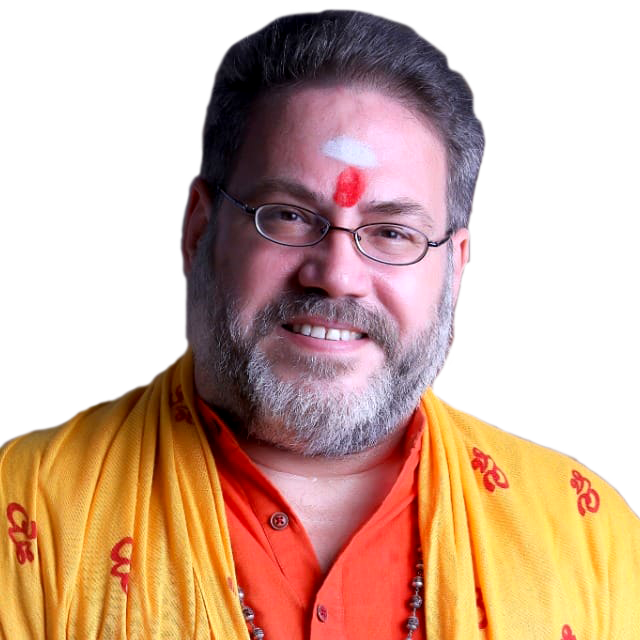Yogacharya Dr Ananda
Balayogi Bhavanani, Editor

Yoga understands the influence of the mind on the body as well as that of the body on the mind. This is the principle of adhi-vyadhi elucidated in the Yoga Vasishta more than 5000 years ago!
It is interesting that modern medicine has only realised this connection in the last hundred years whereas Yogic of India were teaching and practising it for thousands of years.
No wonder Yoga may be considered as the original mind-body medicine.
We are what we think, yet we also start to think that which we do. Yogic concepts and techniques enable the development of right attitudes towards life and enable us to correct the numerous internal and external imbalances we suffer due to our wrong lifestyle/ genetic potential.
Yoga enables us to take responsibility for our own health and happiness and as our Guru Param Pujya Yogamaharishi Dr Swami Gitananda Giri would say, “If you want to be healthy do healthy things, if you want to be happy do happy things”.
The following are just a few of the psychosomatic mechanisms through which Yoga can be said to work as an integrated mind-body medicine:
Cleanses the accumulated toxins through various shuddi kriyas and generates a sense of relaxed lightness through jathis and vyayama type activities. Free flow in all bodily passages prevents the many infections that may occur when pathogens stagnate therein.
Adoption of a Yogic lifestyle with proper nourishing diet, creates positive antioxidant enhancement thus neutralizing free radicals while enabling a rejuvenative storehouse of nutrients packed with life energy to work on anabolic, reparative and healing processes .
Steadies the entire body through different physical postures held in a steady and comfortable manner without strain. Physical balance and a sense of ease with oneself enhance mental / emotional balance and enable all physiological processes to occur in a healthy manner.
Improves control over autonomic respiratory mechanisms though breathing patterns that generate energy and enhance emotional stability. The mind and emotions are related to our breathing pattern and rate and hence the slowing down of the breathing process influences autonomic functioning, metabolic processes as well as emotional responses.
Integrates body movements with the breath thus creating psychosomatic harmony. In Yoga the physical body is related to annamaya kosha (our anatomical existence) and the mind to manomaya kosha (our psychological existence). As the pranayama kosha (our physiological existence sustained by the energy of the breath) lies in between them, the breath is the key to psychosomatic harmony.
Focuses the mind positively on activities being done, thus enhancing energy flow and resultant healthy circulation to the different body parts and internal organs. Where the mind goes, there the prana flows!
Creates a calm internal environment through contemplative practices that in turn enable normalization of homeostatic mechanisms. Yoga is all about balance or samatvam at all levels of being. Mental balance produces physical balance and vice versa too.
Relaxes the body-emotion-mind complex through physical and mental techniques that enhance our pain threshold and coping ability in responding to external and internal stressors. This enhances the quality of life as seen in so many terminal cases where other therapies are not able to offer any solace.
Enhances self confidence and internal healing capacities through the cultivation of right attitudes towards life and moral-ethical living through yama-niyama and various Yogic psychological principles. Faith, self confidence and inner strength are most essential if at all we wish for healing, repair, rejuvenation and re-invigoration.
Yoga works towards restoration of normalcy in all systems of the human body with special emphasis on the psycho-neuro-immuno-endocrine axis.
In addition to its preventive and restorative capabilities, Yoga also aims at promoting positive health that will help us to tide over health challenges that occur during our lifetime. This concept of positive health is one of Yoga’s unique contributions to modern healthcare as Yoga has both a preventive as well as promotive role in the healthcare of our masses. It is also inexpensive and can be used in tandem with other systems of medicine in an integrated manner to benefit patients.
The need of the modern age is to have an integrated approach towards therapy and to utilize Yoga therapy in coordination and collaboration with other systems of medicine such as Allopathy, Ayurveda, Siddha and Naturopathy. Physiotherapy and Chiropractic practices may be used with the Yoga if needed. Advice on diet and lifestyle is very important irrespective of the mode of therapy that is employed for a particular patient.